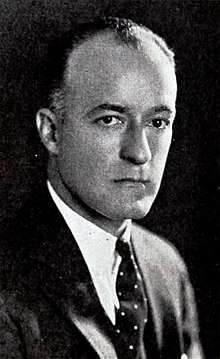Henry Hobart (producer)
Henry Hobart (March 22, 1888 – 1951) was an American film producer during the late silent and early sound eras in the motion picture era. Initially, he was president of Distinctive Productions,[1] but later formed his own independent production company, Henry Hobart Productions. All three of the silent films he produced for his company were distributed by First National Pictures. In 1928, Hobart would go to work for First National, and then would move over to the newly formed RKO Radio Pictures after the advent of talking pictures in 1929.
Henry Hobart | |
|---|---|
 From a 1922 film magazine | |
| Born | Henry Morgan Hobart March 22, 1888 |
| Died | 1951 Los Angeles, California, United States |
| Occupation | Producer |
| Years active | 1926–1935 |
Filmography
| Year | Title | Studio | Silent (S)/Talkie (T) | Notes |
|---|---|---|---|---|
| 1926 | Don Juan's Three Nights | Henry Hobart Productions | S | |
| 1927 | The Crystal Cup | Henry Hobart Productions | S | |
| 1927 | No Place To Go | Henry Hobart Productions | S | |
| 1928 | The Little Shepherd of Kingdom | First National Pictures | S | |
| 1928 | The Noose | First National Pictures | S | |
| 1928 | Out of the Ruins | First National Pictures | S | |
| 1928 | Sailors' Wives | First National Pictures | S | |
| 1928 | Three-Ring Marriage | First National Pictures | S | |
| 1929 | Dance Hall | RKO Radio Pictures | T | |
| 1930 | Alias French Gertie | RKO Radio Pictures | T | |
| 1930 | Beau Bandit | RKO Radio Pictures | T | |
| 1930 | Framed | RKO Radio Pictures | T | |
| 1930 | Half Shot at Sunrise | RKO Radio Pictures | T | |
| 1930 | Lawful Larceny | RKO Radio Pictures | T | |
| 1930 | Love Comes Along[3] | RKO Radio Pictures | T | |
| 1930 | She's My Weakness | RKO Radio Pictures | T | |
| 1931 | Bachelor Apartment | RKO Radio Pictures | T | |
| 1931 | The Royal Bed | RKO Radio Pictures | T | |
| 1931 | Behind Office Doors | RKO Radio Pictures | T | |
| 1931 | High Stakes | RKO Radio Pictures | T | |
| 1931 | White Shoulders | RKO Radio Pictures | T | |
| 1935 | Sunset Range | First Division Productions | T |
gollark: You would need to use ”””subtraction""""" and "modulo".
gollark: You need to do SLIGHTLY more arithmetic than that.
gollark: As planned.
gollark: I *do* do stuff like download entire copies of wikipedia and just never deleting unused files, which is probably why.
gollark: The osmarks.tk™ primary server has 1TB of disk space which is somehow half full.
References
- "Centralized Control Produces Finer Films, Says Hobart". Exhibitors Herald. New York City: Exhibitors Herald Company. 14 (3): 60. January 14, 1922.
- "Henry Hobart". American Film Institute. Retrieved October 3, 2014.
- Jewell, Richard B.; Harbin, Vernon (1982). The RKO Story. New York: Arlington House. p. 25. ISBN 0-517-546566.
This article is issued from Wikipedia. The text is licensed under Creative Commons - Attribution - Sharealike. Additional terms may apply for the media files.